

Operant conditioning. Skinner’s Operant Conditioning: Rewards & Punishments. Operant Conditioning. You've heard of negative reinforcement, but how do you put it into practice?
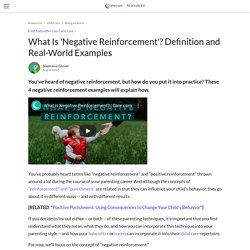
These 4 negative reinforcement examples will explain how. You've probably heard terms like "negative reinforcement" and "positive reinforcement" thrown around a lot during the course of your parenting career. Positive reinforcement. Piaget's Stages of Cognitive Development. My positive reinforcement rewards experiennces.
Teen Bad Behavior & Discipline Plans - Promoting Healthy Growth Ages 15 - 18. Bad behavior doesn't end when your child graduates from diapers -- or even from middle school.
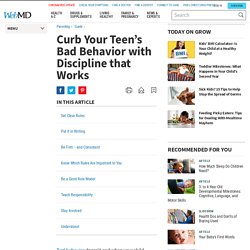
In fact, the teen years can bring some of the toughest discipline challenges parents have to face. Sulking, arguing, lying, and rebelling are just a few of the ways teens misbehave. There's a good explanation for these bad behaviors. As teens become more independent, they still lack the emotional maturity they need to make informed, thoughtful decisions. The parts of the brain that control decision making and impulse control haven't fully developed. You want your children to do the right things, but disciplining teens isn't easy. The goal of discipline is to gain more control over your kids -- without being too controlling. Set Clear Rules Tweens and teens push boundaries to see how their parents will respond. You'll get less resistance if you involve your kids in designing their own consequences. Put It in Writing Continued Be Firm -- and Consistent Teens are master negotiators and manipulators.
6 Positive Reinforcement Examples To Try With Your Kids ... Positive reinforcement — using praise or rewards to shape your child's behavior — means "focusing on the 'good' things your children are doing or certain behaviors that you like and that you want to see more of," explains Melanie Rudnick, a New York City-based parenting expert and conscious parenting coach.
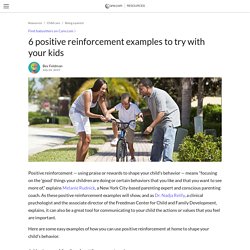
As these positive reinforcement examples will show, and as Dr. Nadja Reilly, a clinical psychologist and the associate director of the Freedman Center for Child and Family Development, explains, it can also be a great tool for communicating to your child the actions or values that you feel are important. How to Reward Your Teen for Good Behavior. Teenagers are young adults who are trying to learn the ways of the world.
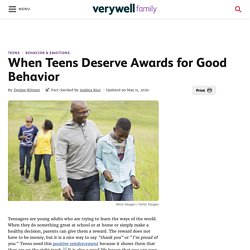
When they do something great at school or at home or simply make a healthy decision, parents can give them a reward. The reward does not have to be money, but it is a nice way to say "thank you" or "I'm proud of you. " Teens need this positive reinforcement because it shows them that they are on the right track.1 It is also a good life lesson that you can pass on: good things happen to good people. Positive Reinforcement: The Big Bang Theory - Sheldon Trains Penny. Positive Reinforcement: The Big Bang Theory - Sheldon Trains Penny II. Positive Punishment. Talking Points: should teenagers have a curfew? - YP. Michael Kwok Pui-hin, 15, Law Ting Pong Secondary School I don’t think teenagers should have a curfew.

The main reason parents set a curfew is that they care about teenagers’ safety. They think it’s important for teenagers who are still learning how to look after themselves. But some teenagers might be more rebellious if they think they’ve lost their freedom. I think the best way to help teenagers mature is to let them understand the importance of being responsible and train their time management skills. Ady Lam, 11, Island School I believe that teenagers should have a curfew. Eunice Yung Po-yiu, 15, Fung Kai Liu Man Shek Tong Secondary School I think teenagers should have a curfew. Joy Lee, 14, South Island School I believe that teenagers should not have a curfew as it doesn’t allow for freedom: teens should learn to be independent and take care of themselves. Ally Chan, 15, Baptist Lui Ming Choi Secondary School But this doesn’t mean teenagers shouldn’t have curfews. Youtube. Youtube.
Negative Reinforcement. Grey’s Anatomy negative reinforcement example. Learning: Negative Reinforcement vs. Punishment. Negative Punishment. This is what happens when you take phones away from teenagers. Punishment affect mental and psychosocial development. Child Discipline: Physical Punishment Can Leave Psychological Marks. Physical punishment on children may have adverse effects that may follow them into adulthood.
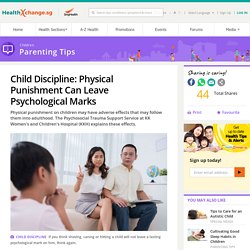
The Psychosocial Trauma Support Service at KK Women's and Children's Hospital (KKH) explains these effects. The psychological impacts of physical punishment A study published in the journal Pediatrics suggests that children subjected to such punishments risk having mental health problems as adults. According to the Canadian researchers, these can show up as mood and anxiety disorders or substance abuse. They analysed data from thousands of American adults in one of the first studies to look at the long-term effects of physical punishment on children, even if the punishment was not major maltreatment or physical abuse.
The study defined “harsh physical punishment” as pushing, grabbing, shoving, slapping or hitting by elders. “The message sent to children through corporal punishment is one of aggression. She said physical punishment usually occurs with psychological aggression. How Punishing Kids Affects them as Adults. References.